Small things make their way and triumph in intimacy at the Salzburg Festival

The Salzburg Festival is usually associated with its imposing Karajan-esque venues (the Grosses Festspielhaus, the Felsenreitschule), productions where every penny is spared, spectators who enjoy showing off their finest finery, and luxury cars parked in rows outside the shows awaiting their owners. All of this is true, of course, but there is also room for other, more humble, non-glossy offerings, with an audience that prefers to dress normally and arrives and departs on foot. And these past few days have seen how, in small, non-glamorous venues, emotions can be experienced that are perhaps more intense and authentic than those offered by, for example, Hotel Metamorphosis and Maria Stuarda , the pasticcio and opera being performed these days at the Haus für Mozart and the Grosses Festspielhaus, both discussed in a previous article .
Mention was also made at that time of the first installment in a series entitled Kleine Nachtmusiken (Small Night Music), because the concerts begin at ten at night; and small, because they take place in a hall at the Stefan Zweig Zentrum that holds no more than eighty people. It stars Viennese baritone Georg Nigl, who sang here on the 18th, at the start of the festival, that masterpiece: The Raft of the Medusa , the brilliant oratorio by Hans Werner Henze. Those who were at the Mozarteum's Grand Gala in 2022 will surely have remembered the singer's recreation of the title character in Jakob Lenz , the youthful and unsettling opera by the late Wolfgang Rihm , who was present in the hall at the time, already in very poor health, in a wheelchair. Three years earlier, this time in a stage version by Andrea Breth, the Austrian baritone had also performed this same role – no one has sung it or made it his own like him – before a stunned audience at the Aix-en-Provence Festival .
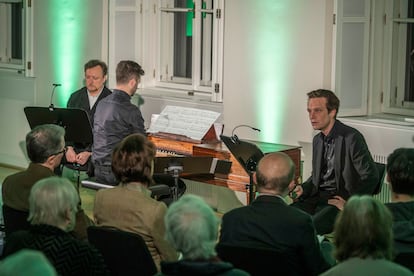
Here, however, he offers us another, very different facet of his art: the interpretation of Lieder in an intimate setting and with keyboard instruments contemporary with the works performed. In the concert that opened the series, Alexander Gergelyfi even played the harpsichord that had once belonged to Wolfgang Amadeus Mozart, around whose last months of life the entire dramaturgy of the concert revolved. The composer chosen for the second installment of the series, on Saturday evening, was Franz Schubert . But on this occasion, texts by his contemporaries were not read; the proposal was much more radical, since the chosen Lieder were interspersed with readings that were chronologically much later and, apparently, had no direct relationship with the poems of the songs. With only two exceptions (Jean Genet and Samuel Beckett), the texts were by 20th-century German and Austrian authors, written in the 1930s and 1940s, when the National Socialist regime condemned many of them to exile, silence, or death.
As chance would have it, the first of them, after Georg Nigl sang Seligkeit (“Bliss beyond measure / blooms in the halls of heaven / for angels and saints, / as our fathers taught us. / How I would like to stand there / and rejoice forever!” runs the first stanza), was the short poem by Karl Kraus that appeared in the October 1933 issue of Die Fackel , just four pages long, after the funeral oration that the writer gave at the burial of Adolf Loos, and which was partially quoted in the previous chronicle, on the occasion of the premiere in Hallein of a new production of The Last Days of Mankind . Man frage nicht deals with the impotence of words in the face of a reality so bleak that it imposes silence, which Kraus explained with verses as laconic as these: “Let no one ask what I've been doing all this time. / I'll remain silent; / and I won't say why. / And there is silence as when the earth shook. / Not a word that hits the mark; / one speaks only from sleep. / And one dreams of a smiling sun. / It passes by; / afterward it didn't matter. / When that world awoke, the word fell asleep.”
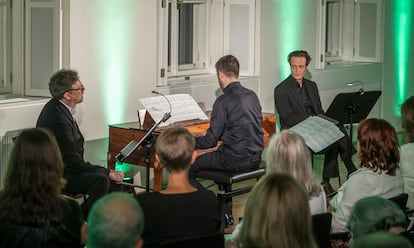
Karl Kraus died in 1936, and three years later, consumed by alcohol, Joseph Roth, another Jew who had been morally and physically annihilated by the Nazi regime, died in Paris. His death was preceded by Nigl's Das Tod und das Mädchen , whose piano part Schubert would later use as the subject of a series of variations in his penultimate string quartet. Alexander Gergelyfi, who was playing that evening on a table piano built in London in 1793, then closed the main lid, significantly diminishing the instrument's sound, which became almost spectral. And Nigl sang the verses of Claudius, a brief dialogue between a girl and Death, with great metrical freedom and a whisper of voice, something unthinkable in a conventional concert hall. In Rest in the Presence of Destruction , Roth recounts how “they are tearing down an old house, a hotel I have lived in for sixteen years, except when I was traveling” and reflects: “Now I sit facing the empty space and listen to the hours slip by. One home after another is lost, I tell myself. Here I am, sitting with my walking stick. My feet ache, my heart is weary, my eyes dry. Misery squats beside me, ever softer and larger, pain remains, grows enormous and kindly, terror roars and can no longer frighten. And that is precisely what is desolate.”
This was followed by a reading of Ernst Toller's Open Letter to Herr Goebbels , between Die Mainacht (although the program indicated otherwise) and Ständchen , the famous serenade included in Schwanengesang , in which Nigl this time opted for an extremely slow tempo and infused Rellstab's poem with a deep melancholy devoid of any romanticism. Surprising pairings followed: Alfred Kerr's "first words after fleeing Germany," in which he declared that "No one goes into exile for pleasure," preceded Goethe's Schäfers Klagelied , a poem about a shepherd's lament, which Schubert set to music at just 17 years of age. Here Gergelyfi opened and closed the side lid of his table piano several times, which slightly alters the instrument's resonance—much less than the main lid. A fragment from Jean Genet's Journal du Voleur , translated into German, preceded another Lied in which a ferryman addresses the Dioscuri, based on one of those hellenophile poems by Johann Mayrhofer. And a passage from Samuel Beckett's travel diary of 1936 in Germany was read, very appropriately, before one of those wandering songs so characteristic of German Romanticism, Der Wanderer , which Nigl sang in a posture unthinkable in a conventional concert: seated (as he was throughout the concert), with both forearms resting on his thighs and leaning slightly forward. To accentuate the drama, Gergelyfi opened the main lid of the table piano again.
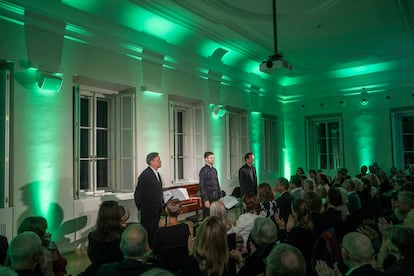
Bertolt Brecht’s Thoughts on the Duration of Exile gave way to a bleak Lied by Schubert’s penultimate work, Totengräbers Heimwehe (Yearnings for the Gravedigger), in which Nigl abandoned the half-voice and magnified the poem’s tragic tone: “To be alive, alas, is so stifling! / In the grave, such peace, such coolness! / But, ah, who will put me in there? / I am alone! – So utterly alone!! / Abandoned by all, / with death as my only relative, / I stand on the brink – / holding the cross / and gaze longingly / down there – into the deep grave! / (…) I am sinking – I am sinking! / My dear ones, I am coming!” Death loomed large, and the lyrics echoed it: first, in two letters from Kurt Tucholsky to Walter Hasenclever and, shortly before his death, to Stefan Zweig. Near the end, in another song about a dialogue between a young man and Death ( Der Jüngling und der Tod ), Nigl seemed to dispense with bar lines altogether in the last two lines: “In my arms you will find soft, cool rest; / You call, I will pity your suffering.”
And the circle was closed, bringing all the pieces together: we found ourselves on the second floor of the Edmundsburg, the building that currently houses the Stefan Zweig Zentrum. Just across the river, also at the top of the Kapuzinerberg, stands, half-hidden among the trees, what was once the Austrian writer's home, which he had to abandon after the Nazis came to power. The recipient of Tucholsky's letter would eventually settle in Brazil, but instead of wondering how long his own exile would last, "exhausted after long years of wandering without a homeland," he himself decided to end it abruptly after realizing that "the world of my native language has perished for me and that my spiritual homeland, Europe, is destroying itself." He took his own life on February 23, 1942, in Petrópolis, and the day before, he wrote and signed his farewell: his Declaraçao , as he titled it. At the end, after greeting all his friends, he exclaimed: "I hope they live to see the dawn after the long night! I, too impatient, go ahead." The reading of the complete text, read soberly but disturbingly by the great actor August Diehl, was the finale of Saturday's "little night music," another constant symbiosis of words and music feeding off each other. At the end of the first concert, after listening to the harpsichord on the few bars of the Lacrimosa that Mozart composed from the Requiem and an excerpt from a letter from Ignaz von Seyfried about his death, the three artists—Georg Nigl, Alexander Gergelyfi, and August Diehl—stood for a few seconds around the composer's harpsichord, as if holding a wake beside his coffin. On Saturday, after reading Zweig's farewell, they could have done the same around the table piano, also rectangular in shape.
It couldn't have fit into the concert, a Schubert-Abend in which all the music was necessarily by the Austrian composer, but descending the Mönchsberg in the rain, just before midnight, it was impossible not to recall, almost like an imaginary epilogue to the wonder we had just experienced, the song that Hanns Eisler, overcome with nostalgia for his language and his country, composed based on a poem by Bertolt Brecht during his American exile and which he would later include in his Hollywood Songbook . In the last verse of Über den Selbstmord (On Suicide), “men shed an unbearable life.” Eisler, moreover, makes it easy: at one point, the singer recalls a snippet of melody from “Gute Nacht” (Good Night), the first song in Schubert's Winterreise . It was a night populated by wanderers.
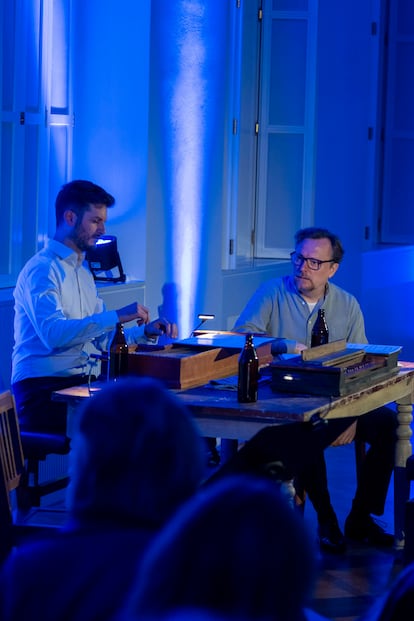
The following day, in the same setting, the proposal was even more radical, not so much in concept, but in its interpretation. The title, Ein Shakespeare-Abend , distanced us from the territory explored the previous two days, since it was not the music, but the texts, that had a single authorship, with the sole exception of a passage from Montaigne's Essays , so admired by Stefan Zweig , and masterfully read again—in German translation—by August Diehl. The selection began with Richard II's monologue about music in the last act of his drama ("How bitter is sweet music when the rhythm is broken, out of all proportion!") and successively touched on Hamlet, Macbeth, Henry VI, Measure for Measure, As You Like It and Troilus and Cressida until ending, as could not be otherwise at this time, with A Midsummer Night's Dream , although the songs also made use of texts from other works, such as Twelfth Night, The Tempest, Othello and The Merry Wives of Windsor.
The concert already got off to an unusual start when, outside the hall, Georg Nigl began humming the first song, "When that I was a little tiny boy ." He then sat down, continued singing, and was accompanied by Alexander Gergelyfi, this time playing two small, historic harpsichords, without legs, resting on a table, with keyboards that barely covered three and a half octaves. The "Admonter" produces a thread of sound, faint but expressive, modulated by the slight changes in pressure and the oscillations of Gergelyfi's fingers. Occasionally, Nigl didn't sing, but instead whispered the text slowly and gravely, as in "O mistris myne" (which Feste sings in "Twelfth Night "). In Full Fathom Five from The Tempest (“Five fathoms of water covered him; / Today your father’s bones are coral; pearls are what his eyes were”), the baritone chose to use a white, falsetto voice, very high and without vibrato, letting the “ding-dong” of the final bells ring out as “the sea-nymphs toll the hour.” In Desdemona’s willow song, again in falsetto, Nigl’s singing was halting, punctuated by sobs, and exhausted, with occasional arpeggiated chords from the harpsichord as his only accompaniment.
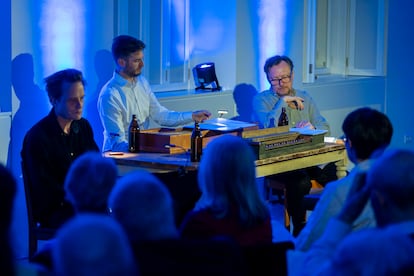
In “It Was a Lover and His Lass,” sung jointly by two pages in As You Like It , Nigl instead resorted to his lowest register, crooning loudly as if drunk while banging his hand on the table. In “The Agincourt Carol,” heralded by drumbeats, he sang at the top of his voice in Latin and Old English to proclaim victory in the historic medieval battle. Finally, the famous monologue from the last act of Macbeth (“life is a tale told by a fool, full of sound and fury”) gave way to “Greensleeves ,” the only music sung with any degree of orthodoxy in the entire concert, which concluded with Robin’s final farewell in “A Midsummer Night’s Dream .” Alexander Gergelyfi’s seriousness, August Diehl’s array of expressive resources, and Georg Nigl’s genius had once again won over the audience. In the two previous performances, the applause was prolonged and generous; On Sunday night they seemed to never want to end.
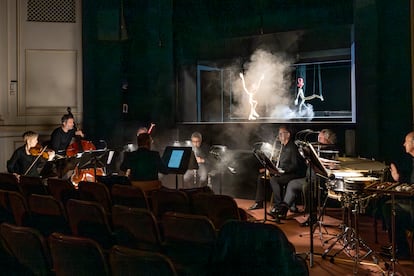
On Saturday afternoon, at the famous Salzburg Marionette Theatre, we saw and heard Stravinsky's The Soldier's Tale , premiered in Lausanne just weeks before the end of the First World War, creating a symbolic bridge to all the texts we would hear later that same evening in years that already foreshadowed the outbreak of its ill-fated sequel. It is unusual to be able to hear the complete work, with the text narrated by Charles-Ferdinand Ramuz and the original instrumentation. Inspired by a folk tale collected by Aleksandr Afanasiev, the story also echoed the Faustian legend, with long European roots: the deserter sells his violin to the Devil in exchange for a book that allows him to predict the future. Its possession makes him rich, but not happy, and after recovering it in a card game, he plays it to cure a princess of her illness, although nostalgia (the same nostalgia Stravinsky felt for his native Russia) and the desire to return to his country cause the soldier to fall once again into the hands of the Devil. The protagonist, Stravinsky recalled many years later, “clearly conceived himself in 1918 as a victim of the then-current world conflict.”
With an excellent, expressive, and very musical narrator, Dominique Horwitz, sitting in the place that the conductor would occupy, and a dream group of instrumentalists, led by the great German violinist Isabelle Faust (what a luxury!) and with big names like clarinetist Pascal Moraguès and cornetist Reinhold Friedrich (the legendary trumpeter of the Lucerne Festival Orchestra), who sometimes also shouted and produced onomatopoeia, the attractions didn't end there. The puppets and the simple stage set (hand-drawn white cloth or paper glued to cardboard) had been designed by Georg Baselitz, one of the great patriarchs of contemporary German art. The puppets, almost disembodied, bore little resemblance to the more or less lifelike ones usually seen on this same stage. They consisted simply of strung hoops or cylinders, with faceless heads that resembled artfully squashed pieces of paper in different colors: red (the Devil), brown (the Soldier), blue (the Princess), gold (the King). The dances (waltz, tango, ragtime), chorales (large and small), and marches, crowned by the Devil's final triumph, came to life with outstanding rhythmic precision and a steely sense of theatricality, while nine puppeteers pulled the puppet strings with unusual skill. There were spectators of all ages in the room, and everyone enjoyed themselves equally.
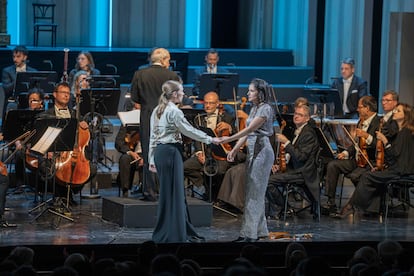
Mozart's music was a must at the festival in his hometown, even if, as on Monday afternoon, it was a semi-staged version of a teenage opera. Mitridate, re di Ponte is not a regular title on stage, although it was seen just last season, in a magnificent production by Claus Guth, at the Teatro Real. Mutatis mutandis , what we saw and heard here was no less impressive, as it featured a cast that was as young as it was well-chosen, in which two sopranos who also triumphed in Madrid shone particularly brightly in the same roles: Elsa Dreisig (Sifare) and Sara Blanch (Aspasia). The former sang the leading role of Louise. Last month at the Aix-en-Provence Festival, she never disappoints, and with the finest voice of all, an infallible technique, and a perfect performance (she captivates the eye even when she's not singing), she's the perfect choice for her role. It's clear that she gets along very well with Sara Blanch, courageous from her fearsome opening aria and equally convincing in the agility and more lyrical passages. Their final duet to close the second act, "Se viver non degg'io," crowned together with a long and personal cadenza, was one of the evening's marvels. And Blanch was granted the privilege of concluding the first half with her aria "Nel grave tormento," as extraordinary as, near the end of the third, "Ah ben, ne fui presaga! ... Pallid' ombre," both of which garnered tremendous applause. The Catalan soprano is increasingly immersed in a major international career and has earned the merits of her own. The Samoan tenor Pene Pati was a bold and courageous Mitridate, undaunted by the abrupt and inhuman high notes Mozart wrote for him: he also aims to become a great singer. The young French countertenor Paul-Antoine Bénos-Djian also made an excellent impression, and his Farnace was far superior in every respect to Franco Fagioli's in Madrid. With better diction and more stage presence, he will undoubtedly be one of the countertenors to watch closely in the coming years. Julie Roset, with her childlike appearance, was a somewhat shy Ismene in her first aria, but improved greatly in the second, "Tu sai per chi m'accese," relocated before the final chorus.
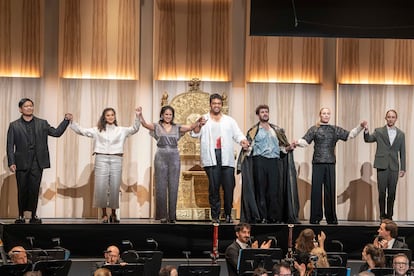
With hardly any resources—a golden throne high above the stage, a pair of screens, minimal props and costumes—the also very young Birgit Kajtna-Wönig showed excellent ideas for her semi-staged proposal. On screen, he played with spelling (with typically Roman letters when singing Marzio, for example, where he also inserted an “SPQR” surrounded by a laurel wreath in “Se di regnar sei vago”), introduced small videos (drops of blood in “Va, va, l'error mio palesa”), surprised with ingenious twists (such as when Pene Pati briefly usurped the conductor’s podium to express his determination to reach the Campidoglio, accompanied himself in the opening recitative of the third act from the fortepiano, or smashed a – fake – violin against the floor, smashing it to pieces, in “Già di pietà mi spoglio”) and, above all, he helped those less familiar with the opera (the majority) to understand the action, just the opposite of what many of his colleagues tend to do. On the podium, the always energetic, enthusiastic, and commanding Adam Fischer conducted with absolute mastery and a constant focus on the singers, despite frequently having them behind him: the Fischer brothers have music in their blood. Wisely, he decided to cut three arias and shorten the recitatives, without in the least affecting this gem from that great little composer who was already Mozart at the age of fourteen. With just the right resources and a display of talent from everyone, it was an exceptional afternoon of opera at the Haus für Mozart.
EL PAÍS

%3Aformat(jpg)%3Aquality(99)%3Awatermark(f.elconfidencial.com%2Ffile%2Fbae%2Feea%2Ffde%2Fbaeeeafde1b3229287b0c008f7602058.png%2C0%2C275%2C1)%2Ff.elconfidencial.com%2Foriginal%2Faa3%2F3ee%2Fd6a%2Faa33eed6aa421f2808f520e5646dc305.jpg&w=1280&q=100)


